27th Annual American Indigenous Tourism Conference Program
October 27-30, 2025
Monday, October 27, 2025
Mobile Workshop #1: Experience Choctaw Culture – Literally
Mobile Workshop #2: Journey to the Heart of Choctaw Heritage
[More Info]
AIANTA, in partnership with the U.S. Forest Service, is excited to announce our Community Navigator programming at this year’s American Indigenous Tourism Conference (AITC)! Please join us for “Cultural Tourism 101 with the Alaska Native Heritage Center” to explore the work and connectedness of the Alaska Native Heritage Center and how they have developed and grown a living cultural center located in Anchorage, Alaska that promotes active observance of Alaska Native culture and traditions. This session will explore housing models that demonstrate how Alaska Natives lived with nature, using the forest for housing, art, hunting and gathering for foods and medicine.
Learn tips on building Indigenous arts programs, working with galleries and museums, organizing local arts markets and more. [More Info]
Sponsors: Mississippi Band of Choctaw Indians and Pearl River Resort
Welcome to the 27th Annual American Indigenous Tourism Conference!
Tuesday, October 28, 2025
Breakout Sessions “1”
Session 1A: AIANTA and University of Nevada Las Vegas Tribal Education Tourism Planning Training Program – Part 1
Tammi Tiger (Choctaw and Muscogee), Director of Tribal Education, University of Nevada Las Vegas (UNLV)
more info ...
AIANTA and University of Nevada Las Vegas Tribal Education Tourism Planning Training Program – Part 1
AIANTA and University of Nevada Las Vegas (UNLV) have joined together to produce a custom training program designed to train Tribal tourism leaders in the best practices of creating cultural tourism systems, exploring connectivity between tourism and land use, and tools for developing a successful grant application proposal, compliance and post-award reporting on U.S. Department of Forestry grants.
Speaker:
Tammi Tiger (Choctaw and Muscogee), Director of Tribal Education, University of Nevada Las Vegas (UNLV)
 As the founding Director of the Tribal Education Initiative, Tammi Tiger is focused on developing future generations of leaders in Tribal gaming & hospitality enterprises through a world-class education at University of Nevada, Las Vegas. Ms. Tiger’s career in public service started with Clark County, department of Public Works, where she spent 25 years in administration and operational support for the engineering, construction and maintenance of public infrastructure with one of the largest counties in the nation and home to the iconic Las Vegas Strip. Ms. Tiger is appointed to the governing board of the Nevada Department of Native American Affairs and the NV Secretary of State’s Advisory Committee on Participatory Democracy. She obtained a Master’s degree of Public Administration from UNLV, where she is also one of the founding members of the UNLV Native American Alumni association. Tammi Tiger is a citizen of The Choctaw Nation of Oklahoma, and a descendant of Muscogee and Seminole nations.
As the founding Director of the Tribal Education Initiative, Tammi Tiger is focused on developing future generations of leaders in Tribal gaming & hospitality enterprises through a world-class education at University of Nevada, Las Vegas. Ms. Tiger’s career in public service started with Clark County, department of Public Works, where she spent 25 years in administration and operational support for the engineering, construction and maintenance of public infrastructure with one of the largest counties in the nation and home to the iconic Las Vegas Strip. Ms. Tiger is appointed to the governing board of the Nevada Department of Native American Affairs and the NV Secretary of State’s Advisory Committee on Participatory Democracy. She obtained a Master’s degree of Public Administration from UNLV, where she is also one of the founding members of the UNLV Native American Alumni association. Tammi Tiger is a citizen of The Choctaw Nation of Oklahoma, and a descendant of Muscogee and Seminole nations.
Session 1B: Empowering Your Community with Strategic Planning Foundations
Dawnielle Tehama, (Klamath), Sr. Associate Principal, Coraggio Group
more info ...
Empowering Your Community with Strategic Planning Foundations
This strategic planning presentation provides tribal tourism enterprises with a structured strategic planning approach that serves as the essential foundation before seeking funding or investment. Without this planning framework, businesses can struggle to clearly articulate their vision and resource needs to potential funders. In session, we will review what it means to have a Resource Assessment Focus. In the workshop, we will addresses resource identification and allocation, helping communities conduct a comprehensive inventory of existing assets before seeking external funding – which is critical for realistic business planning and succession planning. Participants will leave with Funding-Ready outcomes. Having been led through a planning worksheets that directly support grant applications and funding proposals, this workshop will help make communities immediately better positioned to pursue financial opportunities.
Speaker:
Dawnielle Tehama, (Klamath), Sr. Associate Principal, Coraggio Group
 Dawnielle is a tourism professional with extensive experience in stewardship and Indigenous tourism. As a DMO leader, she focused on regenerative travel and diversity initiatives. After law school, she owned small businesses before finding her passion in tourism, where she helped form a Destination Management Organization in Southern Oregon and became a liaison to her tribe. Her career includes overseeing global marketing for the Hualapai Tribe at Grand Canyon West, developing the Hopi Tribe’s economic development plan, and working with multiple tribal organizations including Grand Ronde, Siletz, and Klamath Tribes. She holds a Class III gaming license in three states and has been a speaker for prestigious organizations like The World Travel and Tourism Council regarding Indigenous tourism. Dawnielle’s credentials include certifications as a Certified Diversity Tourism Professional, graduation from the Oregon Tourism Leadership Academy, and recognition as Woman of the Year from the National Tour Association. She Chairs the NTA DEI Advisory council, is a member of the Tourism Cares Program Committee and serves as a Climate Champion within the Expedia Sustainable Destination DMO program. In all her work, she remains dedicated to unifying stakeholder voices while promoting stewardship that sustains communities for generations.
Dawnielle is a tourism professional with extensive experience in stewardship and Indigenous tourism. As a DMO leader, she focused on regenerative travel and diversity initiatives. After law school, she owned small businesses before finding her passion in tourism, where she helped form a Destination Management Organization in Southern Oregon and became a liaison to her tribe. Her career includes overseeing global marketing for the Hualapai Tribe at Grand Canyon West, developing the Hopi Tribe’s economic development plan, and working with multiple tribal organizations including Grand Ronde, Siletz, and Klamath Tribes. She holds a Class III gaming license in three states and has been a speaker for prestigious organizations like The World Travel and Tourism Council regarding Indigenous tourism. Dawnielle’s credentials include certifications as a Certified Diversity Tourism Professional, graduation from the Oregon Tourism Leadership Academy, and recognition as Woman of the Year from the National Tour Association. She Chairs the NTA DEI Advisory council, is a member of the Tourism Cares Program Committee and serves as a Climate Champion within the Expedia Sustainable Destination DMO program. In all her work, she remains dedicated to unifying stakeholder voices while promoting stewardship that sustains communities for generations.
Session 1C: The Pueblo Model: Community-Based Tourism Grounded in Tradition
Deborah Torres (San Ildefonso and Isleta Pueblo), Chief Executive Officer, Passport To Pueblo Country
more info ...
The Pueblo Model: Community-Based Tourism Grounded in Tradition
In Pueblo communities, tourism is not a product—it is a responsibility. This session will explore how Pueblo-led tourism models center language, land, family, and ceremony in every experience offered. From traditional meals and guided hikes to feast day etiquette and multigenerational storytelling, this session highlights how community-based tourism can preserve cultural integrity, provide direct economic benefits to families, and serve as a tool for cultural pride and preservation. Speakers will share best practices for cultural review, capacity building, and visitor education to ensure traditions remain intact as tourism grows.
Speaker:
Deborah Torres (San Ildefonso and Isleta Pueblo), Chief Executive Officer, Passport To Pueblo Country
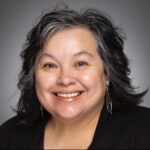 Deborah Torres is a Native entrepreneur, cultural preservation advocate, and tribal liaison based in New Mexico. She is the founder of Passport to Pueblo Country and serves as the Tribal Liaison for the City of Santa Fe’s Economic Development Department. With deep roots in San Ildefonso Pueblo and over two decades of experience in Indigenous tourism, policy, and community engagement, Deborah is dedicated to creating culturally grounded, sustainable opportunities that uplift Native voices and traditions.
Deborah Torres is a Native entrepreneur, cultural preservation advocate, and tribal liaison based in New Mexico. She is the founder of Passport to Pueblo Country and serves as the Tribal Liaison for the City of Santa Fe’s Economic Development Department. With deep roots in San Ildefonso Pueblo and over two decades of experience in Indigenous tourism, policy, and community engagement, Deborah is dedicated to creating culturally grounded, sustainable opportunities that uplift Native voices and traditions.
Breakout Sessions “2”
Session 2A: AIANTA and University of Nevada Las Vegas Tribal Education Tourism Planning Training Program – Part 2
Tammi Tiger (Choctaw and Muscogee), Director of Tribal Education, University of Nevada Las Vegas (UNLV)
more info ...
AIANTA and University of Nevada Las Vegas Tribal Education Tourism Planning Training Program – Part 2
AIANTA and UNLV have joined together to produce a custom training program designed to train Tribal tourism leaders in the best practices of creating cultural tourism systems, exploring connectivity between tourism and land use, and tools for developing a successful grant application proposal, compliance and post-award reporting on U.S. Department of Forestry grants.
Speaker:
Tammi Tiger (Choctaw and Muscogee), Director of Tribal Education, University of Nevada Las Vegas (UNLV)
 As the founding Director of the Tribal Education Initiative, Tammi Tiger is focused on developing future generations of leaders in Tribal gaming & hospitality enterprises through a world-class education at University of Nevada, Las Vegas. Ms. Tiger’s career in public service started with Clark County, department of Public Works, where she spent 25 years in administration and operational support for the engineering, construction and maintenance of public infrastructure with one of the largest counties in the nation and home to the iconic Las Vegas Strip. Ms. Tiger is appointed to the governing board of the Nevada Department of Native American Affairs and the NV Secretary of State’s Advisory Committee on Participatory Democracy. She obtained a Master’s degree of Public Administration from UNLV, where she is also one of the founding members of the UNLV Native American Alumni association. Tammi Tiger is a citizen of The Choctaw Nation of Oklahoma, and a descendant of Muscogee and Seminole nations.
As the founding Director of the Tribal Education Initiative, Tammi Tiger is focused on developing future generations of leaders in Tribal gaming & hospitality enterprises through a world-class education at University of Nevada, Las Vegas. Ms. Tiger’s career in public service started with Clark County, department of Public Works, where she spent 25 years in administration and operational support for the engineering, construction and maintenance of public infrastructure with one of the largest counties in the nation and home to the iconic Las Vegas Strip. Ms. Tiger is appointed to the governing board of the Nevada Department of Native American Affairs and the NV Secretary of State’s Advisory Committee on Participatory Democracy. She obtained a Master’s degree of Public Administration from UNLV, where she is also one of the founding members of the UNLV Native American Alumni association. Tammi Tiger is a citizen of The Choctaw Nation of Oklahoma, and a descendant of Muscogee and Seminole nations.
Session 2B: Nevada’s Indian Territory Eco-cultural Tourism Project
Ben Rupert (Duck Valley Shoshone Paiute and Washoe), Officer – Destination Development, Nevada’s Indian Territory
more info ...
Nevada’s Indian Territory Eco-cultural Tourism Project
Nevada’s Indian Territory (NIT) vision: “Changing the world through eco-cultural tourism of the Great Basin.” NIT combines unique ecotourism opportunities, natural beauty, abundant wildlife, and the rich culture of the Great Basin Indigenous People to create an authentic and meaningful eco-cultural travel experience. NIT implements the principles of sustainable destination planning and marketing which utilizes best sustainability practices with a clear definition of a vision, sustainability pillars, and sustainable guiding principles. These principles of sustainable destination planning will provide a pathway for a regenerative, responsible and authentic travel experience that improves the health of the land and health of the Great Basin Indigenous People.
The purpose of the Nevada’s IndianTerritory Eco-cultural Tourism (NITET) project is to strengthen cultural awareness and cultural identity through authentic eco-cultural tourism, while being environmentally responsible, inclusive of the Great Basin Indigenous People, and provide economic development opportunities. The NITET project utilizes a community value-based sustainable destination development approach that collaborates with all stakeholders to promote a niche tourism of the Great Basin Indigenous People. The NITET project is a unique opportunity to combine ecotourism and cultural tourism (eco-cultural tourism) to promote cultural awareness, cultural identify, authentic destination development, and economic development for Nevada’s 28 – Tribes while being stewards of the Great Basin ecosystem. It’s a majestic land of natural and cultural treasures. NITET offers paddle boarding the crystal-clear waters of Lake Tahoe, hiking the Valley of Fire and experiencing its magnificent petroglyphs, camping in the Jarbidge Wilderness, being on top of the Great Basin National Park with endless stars, to fishing for world-class Lahontan Cutthroat Trout at Pyramid Lake. With natural beauty, abundant wildlife, and the rich culture of its Great Basin Indigenous People. A concept in which ecological and cultural aspects of the Great Basin are combined to create a special destination for tourists.
Speaker:
Ben Rupert (Duck Valley Shoshone Paiute and Washoe), Officer – Destination Development, Nevada’s Indian Territory
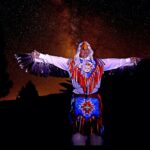 Ben Rupert Ben is of Duck Valley Shoshone-Paiute and Washoe descent. Ben is part of the Nevada’s Indian Territory leadership team, a marketing arm of the Nevada Commission on Tourism. He is a Native dancer and traditional artist. His passion is to share his Native culture through cultural presentations, dancing, fishing, hunting, traditional art, and being a steward of the Great Basin culture. He recently retired from the City of Reno Fire Department, after 33 years, in the fire service. Ben graduated from Oregon State University and recently received a master’s degree in Sustainable Tourism from Arizona State University. He also served in the U.S. Army as an Airborne/Infantryman.
Ben Rupert Ben is of Duck Valley Shoshone-Paiute and Washoe descent. Ben is part of the Nevada’s Indian Territory leadership team, a marketing arm of the Nevada Commission on Tourism. He is a Native dancer and traditional artist. His passion is to share his Native culture through cultural presentations, dancing, fishing, hunting, traditional art, and being a steward of the Great Basin culture. He recently retired from the City of Reno Fire Department, after 33 years, in the fire service. Ben graduated from Oregon State University and recently received a master’s degree in Sustainable Tourism from Arizona State University. He also served in the U.S. Army as an Airborne/Infantryman.
Session 2C: Food as Heritage: Reclaiming Culture and Identity Through the Indigenous Table
David Skinner (Choctaw), Chef/Owner, Ishtia and Eculent
more info ...
Food as Heritage: Reclaiming Culture and Identity Through the Indigenous Table
In a world where culinary trends come and go, Indigenous foodways remain rooted in centuries of wisdom, storytelling, and survival. As a Choctaw chef, entrepreneur, and founder of Ishtia—a concept dedicated to preserving and evolving Indigenous cuisine—I believe food is not just sustenance but cultural testimony. This session explores how Indigenous tourism can be revitalized and redefined through the lens of food sovereignty, experiential storytelling, and the power of taste. Drawing from my journey—culinary storytelling at Eculent, international exploration, and the revival of ancestral recipes—I’ll share how Indigenous chefs and communities can use food as a bridge between past and future, sacred and shared, memory and modernity.
Attendees will gain insights into how to build immersive, educational, and emotionally resonant food experiences that celebrate Native heritage while appealing to global travelers seeking authenticity. I will also highlight challenges and opportunities in scaling Indigenous culinary tourism without compromising integrity, tradition, or land stewardship.
This presentation is for tribal tourism leaders, entrepreneurs, chefs, educators, and creatives ready to elevate Indigenous experiences—on the plate and beyond.
Speaker:
David Skinner (Choctaw), Chef/Owner, Ishtia and Eculent
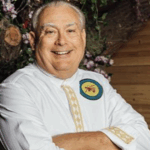 David Skinner is a Choctaw chef, author, and culinary visionary behind Ishtia and Eculent. Known for his immersive, story-driven approach to food, David blends Indigenous traditions with modern gastronomy to create unforgettable experiences. A lifelong traveler and former commodities executive, his global journey informs a deep understanding of how culture, memory, and flavor intersect. David is committed to reclaiming and elevating Indigenous cuisine, using food as a medium for healing, connection, and transformation. Through Ishtia, he brings ancient Choctaw foodways into contemporary dialogue—while mentoring others to do the same. His work has been featured at national conferences, cultural institutions, and in culinary circles dedicated to Indigenous revitalization. David is a passionate advocate for tourism that respects the land, honors the people, and feeds both body and spirit.
David Skinner is a Choctaw chef, author, and culinary visionary behind Ishtia and Eculent. Known for his immersive, story-driven approach to food, David blends Indigenous traditions with modern gastronomy to create unforgettable experiences. A lifelong traveler and former commodities executive, his global journey informs a deep understanding of how culture, memory, and flavor intersect. David is committed to reclaiming and elevating Indigenous cuisine, using food as a medium for healing, connection, and transformation. Through Ishtia, he brings ancient Choctaw foodways into contemporary dialogue—while mentoring others to do the same. His work has been featured at national conferences, cultural institutions, and in culinary circles dedicated to Indigenous revitalization. David is a passionate advocate for tourism that respects the land, honors the people, and feeds both body and spirit.
Join members of the AIANTA Board of Directors and nearby colleagues to discuss issues and challenges facing your region. Input gathered at these sessions will help AIANTA advise decision makers in supporting Indigenous tourism development and growth, and determine how to best deliver training and other resources.
more info ...
Northern Alaska
Southeast Alaska
Hawai’i
Central California
Southern California
Northwest (Idaho, Washington)
Pacific Northwest (Northern California, Oregon)
Great Basin (Nevada, Eastern California)
Oklahoma
Rocky Mountain (Montana, North Dakota, South Dakota, Wyoming)
Central Plains (Indiana, Iowa, Illinois, Kansas, Missouri, Nebraska, Ohio)
Midwest (Michigan, Minnesota, Wisconsin)
Southwest (Arizona, Colorado, New Mexico, West Texas, Utah)
Northeast (Connecticut, District of Columbia, Delaware, Kentucky, Massachusetts, Maryland, Maine, New Hampshire, New Jersey New York, Rhode Island, Pennsylvania, Virginia, Vermont, West Virginia)
Southeast (Alabama, Arkansas, East Texas, Florida, Georgia, Louisiana, Mississippi, North Carolina, South Carolina, Tennessee)
Wednesday, October 29, 2025
President & CEO Report
Travis Owens (Cherokee Nation), AIANTA Board President
Sherry L. Rupert, (Paiute/Washoe), AIANTA CEO
Breakout Sessions “3”
Session 3A: Simplifying AI: Practical Tools for Indigenous Tourism
Daniel Willems, Owner, Lanier Web Development
more info ...
Simplifying AI: Practical Tools for Indigenous Tourism
Artificial Intelligence (AI) doesn’t have to feel overwhelming or out of reach. In this engaging, one-hour workshop, you’ll discover practical and accessible AI tools specifically tailored to elevate Indigenous tourism initiatives. No technical expertise required—just a willingness to explore! Through live demonstrations, you’ll see firsthand how AI can: Generate eye-catching visuals and promotional materials in minutes; Easily create compelling videos and digital stories to enhance visitor engagement; Improve guest experiences through personalized communication and services; Streamline everyday tasks, making operations more efficient; You’ll walk away feeling confident and empowered, equipped with real-world tips and actionable strategies that you can implement immediately. Bring a laptop or device (and questions) if you’d like to follow along with the demonstrations and experiment during the session. (Completely optional—feel free to just observe and learn!) Join us to simplify AI and unlock practical tools to share your Indigenous story, attract visitors, and enrich your tourism offerings.
Speaker:
Daniel Willems, Owner, Lanier Web Development
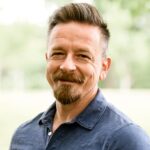 Daniel Willems is a seasoned technology leader and advocate for meaningful, human-centered applications of AI in tourism. With extensive experience partnering directly with Indigenous communities and tourism organizations, Daniel specializes in practical, accessible AI tools that empower tribes to effectively share their stories, enhance visitor experiences, and streamline daily operations. He was the original architect of the tourism website NativeAmerica.travel, which set new standards in showcasing Indigenous tourism experiences across North America.
Daniel Willems is a seasoned technology leader and advocate for meaningful, human-centered applications of AI in tourism. With extensive experience partnering directly with Indigenous communities and tourism organizations, Daniel specializes in practical, accessible AI tools that empower tribes to effectively share their stories, enhance visitor experiences, and streamline daily operations. He was the original architect of the tourism website NativeAmerica.travel, which set new standards in showcasing Indigenous tourism experiences across North America.
In addition to his work in tourism, Daniel is the founder of TYB.AI, an education platform that uses safe, conversational AI to support children’s learning and help families build strong habits together. Whether in classrooms or cultural centers, his mission is consistent: simplify complex technology to serve real human needs. Daniel’s engaging workshops equip attendees with immediate, actionable strategies to confidently leverage AI in their tourism initiatives — and beyond.
Session 3B: Beyond Exhibits: How Tribal Museums Foster Respectful Tourism and Protect Sacred Places
Ericca Hovie (Sault Ste. Marie Tribe of Chippewa Indians), Public Affairs & Communications Director, Association on American Indian Affairs
more info ...
Beyond Exhibits: How Tribal Museums Foster Respectful Tourism and Protect Sacred Places
Tribal Museums are more than cultural repositories—they are dynamic gateways to respectful, Native-led tourism that uplifts Tribal sovereignty, strengthens economies, and protects Sacred places. This session, co-led by Maurice C. Jackson, Director of Museum Services at the Mashantucket Pequot Museum & Research Center, and CC Hovie, citizen of the Sault Ste. Marie Tribe of Chippewa Indians and Communications and Public Affairs Director for the Association on American Indian Affairs (Association), will explore how Tribal Museums are leading the way in land-based tourism experiences—such as guided hikes, storytelling walks, cultural demonstrations, and ecological education.
The Association’s Tribal Museums Day, a national awareness campaign held each December, demonstrates how these Native-led institutions connect visitors to broader cultural landscapes. The event draws attention to Tribal Museums as vital places to learn from Native experts about history, culture, lifeways, and values. Additionally, Tribal Museums can act as entryways to nearby Sacred sites and traditional lands. In this way, Tribal Museums not only promote educational tourism and support Tribal economies—they also help guide respectful visitor engagement with the land itself.
This session will further explore how Tribal-led tourism efforts can support the protection of Sacred places—many of which are located on public lands and face continued threats from unchecked development and recreational use. Presenters will share examples and strategies that show how partnerships between museums, land stewards, and tourism programs can help ensure these culturally significant areas are honored, protected, and experienced through an Indigenous lens.
Attendees will walk away with practical ideas for designing tourism experiences that center Tribal leadership, protect Sacred lands, and strengthen the role of Tribal Museums as anchors of cultural sovereignty and sustainable tourism.
Speaker:
Ericca Hovie (Sault Ste. Marie Tribe of Chippewa Indians), Public Affairs & Communications Director, Association on American Indian Affairs
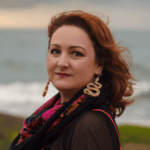 Ericca “CC” Hovie is a citizen of the Sault Ste. Marie Tribe of Chippewa Indians and serves the Association on American Indian Affairs as its Public Affairs and Communications Director. The Association is the longest serving national Native nonprofit, since 1922. As a marketing and communications professional, CC has worked and volunteered for several non-profit organizations over the past two decades. As a former Traverse City Roller Derby Board Member, Northwest Michigan Association of Volunteer Administrators Board Member, and Bay Area Senior Advocates Senior Expo Co-Chair she worked to expand each organization’s reach and impact in the community. A lifelong learner, she attended Lake Superior State University and Ferris State University where she received leadership and management training. Prior to her position at the Association, she served as the communications manager for StrongHearts Native Helpline. Finding and supporting Native creators on social media is one of CC’s favorite things to do. A self-described reconnecting Native, participating in pow wows and sharing her culture brings her joy and fulfills her spirit.
Ericca “CC” Hovie is a citizen of the Sault Ste. Marie Tribe of Chippewa Indians and serves the Association on American Indian Affairs as its Public Affairs and Communications Director. The Association is the longest serving national Native nonprofit, since 1922. As a marketing and communications professional, CC has worked and volunteered for several non-profit organizations over the past two decades. As a former Traverse City Roller Derby Board Member, Northwest Michigan Association of Volunteer Administrators Board Member, and Bay Area Senior Advocates Senior Expo Co-Chair she worked to expand each organization’s reach and impact in the community. A lifelong learner, she attended Lake Superior State University and Ferris State University where she received leadership and management training. Prior to her position at the Association, she served as the communications manager for StrongHearts Native Helpline. Finding and supporting Native creators on social media is one of CC’s favorite things to do. A self-described reconnecting Native, participating in pow wows and sharing her culture brings her joy and fulfills her spirit.
Session 3C: Partners in Prosperity: Strengthening Indigenous Tourism through Tribal Gaming & Hospitality Collaborations
Apache Danforth (Oneida Nation of Wisconsin), Owner & Founder, Good Words Consulting
Donovan Hanley (Navajo), Navajo Nation Hospitality Enterprise
Brandie Tangle (Mississippi Band of Choctaw Indians), Resort Sales, Pearl River Resort
William Lowe (Muskogee), Executive Director, Muskogee Tourism
more info ...
Partners in Prosperity: Strengthening Indigenous Tourism through Tribal Gaming & Hospitality Collaborations
The intersection of Indigenous tourism and Indian gaming is not often examined, yet it offers powerful opportunities for community-driven economic growth, cultural preservation, and the protection of Tribal sovereignty. This engaging panel will spotlight how Indigenous tourism companies can partner with DMOs, and leaders in tribal gaming and hospitality to create immersive, authentic guest experiences. that don’t compete with keeping customers on the casino floor and a cultural heritage experience that keeps them wanting to return.
Together, panelists will explore how collaboration between Indigenous tourism industry, entrepreneurs and tribal enterprises is reshaping the future of destination development in Indian Country.
From joint marketing efforts to integrated cultural programming, panelists will share how strategic partnerships are fostering mutual understanding, expanding economic opportunities, and strengthening tribal identity. These efforts are building more resilient, year-round visitor economies grounded in both innovation and tradition.
Speakers:
Apache Danforth (Oneida Nation of Wisconsin), Owner & Founder, Good Words Consulting
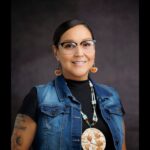 Apache Danforth (Good Words Consulting & Good Words Travel): Apache is a seasoned consultant specializing in sustainable Indigenous tourism, strategic planning, public relations/communications, business and economic development. With a focus on promoting authentic tribal experiences, she has successfully supported tribes in enhancing their tourism and overall operations.
Apache Danforth (Good Words Consulting & Good Words Travel): Apache is a seasoned consultant specializing in sustainable Indigenous tourism, strategic planning, public relations/communications, business and economic development. With a focus on promoting authentic tribal experiences, she has successfully supported tribes in enhancing their tourism and overall operations.
Donovan Hanley (Navajo), Navajo Nation Hospitality Enterprise
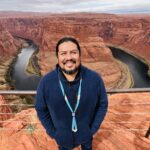 With a Bachelor of Science from Northern Arizona University, Donovan Hanley spent three years out of college with the students of Greyhills Academy High School, where he offered technical work skills, hospitality management guidance, and his connection to the travel industry. Being only one of two Hospitality Instructors in Northern Arizona, he guided students through the Career and Technical Education program and into community college-level courses. In the following years, he took on the sales and marketing initiatives of the Navajo Nation Hospitality Enterprise (NNHE) as Director of Sales. This role primarily involved being a strong voice for Navajoland to the World. Some of his duties were akin to those of a Destination Marketing Organization (DMO). Speaking to anyone and every possible prospective market, he highlighted the Navajo Nation while building relationships and network partnerships. Today, he has come full circle as a current board member of NNHE. Born to the Towering House Clan and born for the Water Flowing Together Clan, he is a proud Diné (Navajo), grandson of the Salt Clan and the Red Running into the Water Clan. He hails from the close-knit community of Na’ahtee Canyon on the Navajo Nation in northern Arizona, where the spirit of hospitality and cultural connection was instilled in me from a young age.
With a Bachelor of Science from Northern Arizona University, Donovan Hanley spent three years out of college with the students of Greyhills Academy High School, where he offered technical work skills, hospitality management guidance, and his connection to the travel industry. Being only one of two Hospitality Instructors in Northern Arizona, he guided students through the Career and Technical Education program and into community college-level courses. In the following years, he took on the sales and marketing initiatives of the Navajo Nation Hospitality Enterprise (NNHE) as Director of Sales. This role primarily involved being a strong voice for Navajoland to the World. Some of his duties were akin to those of a Destination Marketing Organization (DMO). Speaking to anyone and every possible prospective market, he highlighted the Navajo Nation while building relationships and network partnerships. Today, he has come full circle as a current board member of NNHE. Born to the Towering House Clan and born for the Water Flowing Together Clan, he is a proud Diné (Navajo), grandson of the Salt Clan and the Red Running into the Water Clan. He hails from the close-knit community of Na’ahtee Canyon on the Navajo Nation in northern Arizona, where the spirit of hospitality and cultural connection was instilled in me from a young age.
Brandie Tangle (Mississippi Band of Choctaw Indians), Resort Sales, Pearl River Resort
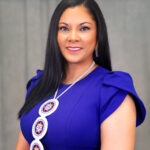 Brandie brings expertise in the integration of tourism strategies with gaming operations. She offers personal insight and perspective into the challenges faced with bringing cultural heritage tourism to the Mississippi Choctaw as well as the advantages that arise from the development of a cultural tourism program.
Brandie brings expertise in the integration of tourism strategies with gaming operations. She offers personal insight and perspective into the challenges faced with bringing cultural heritage tourism to the Mississippi Choctaw as well as the advantages that arise from the development of a cultural tourism program.
William Lowe (Muskogee), Executive Director, Muskogee Tourism
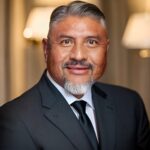 William Lowe, a proud alumnus of a tribal boarding school and a U.S. Marine Corps veteran, is deeply connected to the causes he champions. His 20 years of experience in economic development, nonprofit leadership, tribal governance, and strategic fundraising are not just professional achievements but a reflection of his commitment to his community. Currently, as the President of the American Indian Chamber of Commerce of Oklahoma, he continues to champion Native-owned businesses and advocate for economic growth across tribal communities. His tenure as Tourism Director for the Cherokee Nation and the Muscogee (Creek) Nation, where he raised funds for the Seven Star Gala and the Mvskoke Hall of Fame Gala, is a testament to his effective leadership. His leadership extends nationally, as he serves on the board of directors for the National Center for American Indian Enterprise Development (NCAIED) and as Veterans Committee Co- Chairman and Sergeant-at-Arms for the National Congress of American Indians (NCAI), where he remains a powerful voice for Native veterans and tribal sovereignty.
William Lowe, a proud alumnus of a tribal boarding school and a U.S. Marine Corps veteran, is deeply connected to the causes he champions. His 20 years of experience in economic development, nonprofit leadership, tribal governance, and strategic fundraising are not just professional achievements but a reflection of his commitment to his community. Currently, as the President of the American Indian Chamber of Commerce of Oklahoma, he continues to champion Native-owned businesses and advocate for economic growth across tribal communities. His tenure as Tourism Director for the Cherokee Nation and the Muscogee (Creek) Nation, where he raised funds for the Seven Star Gala and the Mvskoke Hall of Fame Gala, is a testament to his effective leadership. His leadership extends nationally, as he serves on the board of directors for the National Center for American Indian Enterprise Development (NCAIED) and as Veterans Committee Co- Chairman and Sergeant-at-Arms for the National Congress of American Indians (NCAI), where he remains a powerful voice for Native veterans and tribal sovereignty.
Speaker: Florian Herrmann, Founder and CEO, Herrmann Global
Breakout Sessions “4”
Session 4A: Overnight accommodations in Indian Country
Matt Robinson, Co-Founder & Pricipal, KlasRobinson Q.E.D.
Wallace Youvella, Moenkopi Legacy Inn (Hopi)
more info ...
Overnight accommodations in Indian Country
This panel will provide an overview of the various lodging segments in Indian Country including Hotels, Resorts, Lodges, RV parks, Campgrounds and other lodging alternatives (“Glamping”, etc.). This will include a current census of tribally-owned properties by type and location. The panel will then present demographic and market trends for the various overnight segments. This will be followed by case studies of existing tribally-owned lodging/hospitality properties, which will include an overview of current operations, followed by a discussion – with Q & A, of trends, opportunities and challenges faced by the operators.
Speakers:
Matt Robinson, Co-Founder and Principal, KlasRobinson Q.E.D.
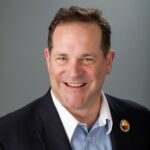 Co-founder and Principal of KlasRobinson Q.E.D., Matt Robinson has been a consultant in the hospitality industry for more than 30 years, specializing in market research, feasibility analyses and economic impact studies. With a background in planning and economic development, Mr. Robinson has specific expertise working in Indian Country on gaming and other tribal economic diversification projects – both on and off the reservation. Mr. Robinson has worked with more than 260 different Tribes throughout North America over the past two decades. Feasibility studies and other expert counseling provided by the principals of KlasRobinson Q.E.D. have been used to successfully attract over $25.0 billion in financing and investment from bank financing, capital leases, private placements, registered securities and IPO’s. Mr. Robinson currently serves on the executive advisory board of BETA – a nonprofit organization that runs two main programs – Twin Cities Startup Week (TCSW), which inspires would-be entrepreneurs to start a business and the BETA Cohort, a free, non-dilutive accelerator which trains founders on the topics required to grow their business. Mr. Robinson also serves on the advisory board of Sobrynth – an on-line platform for employers that provides 24 x 7 assistance for employees and their families who are seeking support with immediate substance use disorder needs and for those employees who are sober curious. Mr. Robinson served two consecutive two-year terms on the Executive Board of the National Indian Gaming Association (NIGA). Mr. Robinson is the recipient of NIGA’s 2010 “Outstanding Service Award” and OIGA’s 2024 “Warrior’s Award for Lifetime Achievement as a Champion in the cause of Oklahoma Indian Gaming”. Mr. Robinson has a Master’s degree in Planning with a secondary concentration in economic and community development from the Hubert H. Humphrey School of Public Affairs at the University of Minnesota.
Co-founder and Principal of KlasRobinson Q.E.D., Matt Robinson has been a consultant in the hospitality industry for more than 30 years, specializing in market research, feasibility analyses and economic impact studies. With a background in planning and economic development, Mr. Robinson has specific expertise working in Indian Country on gaming and other tribal economic diversification projects – both on and off the reservation. Mr. Robinson has worked with more than 260 different Tribes throughout North America over the past two decades. Feasibility studies and other expert counseling provided by the principals of KlasRobinson Q.E.D. have been used to successfully attract over $25.0 billion in financing and investment from bank financing, capital leases, private placements, registered securities and IPO’s. Mr. Robinson currently serves on the executive advisory board of BETA – a nonprofit organization that runs two main programs – Twin Cities Startup Week (TCSW), which inspires would-be entrepreneurs to start a business and the BETA Cohort, a free, non-dilutive accelerator which trains founders on the topics required to grow their business. Mr. Robinson also serves on the advisory board of Sobrynth – an on-line platform for employers that provides 24 x 7 assistance for employees and their families who are seeking support with immediate substance use disorder needs and for those employees who are sober curious. Mr. Robinson served two consecutive two-year terms on the Executive Board of the National Indian Gaming Association (NIGA). Mr. Robinson is the recipient of NIGA’s 2010 “Outstanding Service Award” and OIGA’s 2024 “Warrior’s Award for Lifetime Achievement as a Champion in the cause of Oklahoma Indian Gaming”. Mr. Robinson has a Master’s degree in Planning with a secondary concentration in economic and community development from the Hubert H. Humphrey School of Public Affairs at the University of Minnesota.
Wallace Youvella, Moenkopi Legacy Inn (Hopi)
Session 4B: Navigating Multi-Channel Marketing with Limited Resources
John Wickes, (Hualapai Tribe), Director of Sales and Marketing, Grand Canyon Resort Corporation
more info ...
Navigating Multi-Channel Marketing with Limited Resources
“Navigating Multi-Channel Marketing with Limited Resources” is a practical, insights-driven session designed for marketers facing budget constraints but still expected to deliver results. This presentation explores how to strategically prioritize marketing channels, craft impactful messaging, and repurpose content across platforms—without overspending. Attendees will learn how to leverage data, low-cost tools, and smart testing methods to drive engagement and ROI. Whether you’re a small team or working within tight parameters, this session offers actionable strategies to help you do more with less.
Speaker:
John Wickes, (Hualapai Tribe), Director of Sales and Marketing, Grand Canyon Resort Corporation
 John Wickes currently leads the sales and marketing efforts for Grand Canyon Resort Corporation, home to the world-famous Skywalk at Grand Canyon West. A seasoned hospitality executive with over 30 years of experience, John has built a distinguished career driving growth for casino resorts, entertainment venues, and tourist attractions. He has played a key role in the launch and expansion of multi-billion-dollar casino properties and has been instrumental in bringing some of the world’s most iconic nightlife brands to market.
John Wickes currently leads the sales and marketing efforts for Grand Canyon Resort Corporation, home to the world-famous Skywalk at Grand Canyon West. A seasoned hospitality executive with over 30 years of experience, John has built a distinguished career driving growth for casino resorts, entertainment venues, and tourist attractions. He has played a key role in the launch and expansion of multi-billion-dollar casino properties and has been instrumental in bringing some of the world’s most iconic nightlife brands to market.
Session 4C: Restoring Our Narrative: Culture and Community Resilience Through Partnerships and Place
Ciarra Greene (Nimiipuu – Nez Perce), Cultural Education & Workforce Development Coordinator, Nez Perce Tourism
more info ...
Restoring Our Narrative: Culture and Community Resilience Through Partnerships and Place
Indigenous tourism is more than a business—it is a way of life that reclaims narrative, uplifts culture, and reconnects communities to place. This session spotlights Nez Perce Tourism’s work at the intersection of cultural identity, strategic partnerships, and economic innovation. From restoring original place names to mentoring youth and collaborating across sectors, learn how Indigenous-led tourism efforts elevate Native visibility, strengthen sovereignty, and inspire a paradigm shift in how tourism is understood. Attendees will explore how tourism can honor tradition while advancing shared goals across tribal and non-tribal communities.
Speaker:
Ciarra Greene (Nimiipuu – Nez Perce), Cultural Education & Workforce Development Coordinator, Nez Perce Tourism
 Sapooq’is Wíit’as (Nimiipuu)/ Ciarra Greene (Nez Perce) formerly served as the Education and Business Development Director for AIANTA. With her Master of Science in Science Teaching from Portland State University (2019) and Bachelor of Science in Chemistry from Northern Arizona University, her focus has been on promoting the protection and healing of Indigenous communities and homelands through culture, education, and science. Her experience in tourism rapidly developed in the past six years, while her fifteen years of experience in outreach and education, founded in interdisciplinary collaboration with tribal communities, institutions, agencies, organizations, and businesses, have propelled her career. She views our collective role in tourism truly as an educational experience for Indigenous communities and our visiting guests alike. Ciarra strives to perpetuate her passion so others too may attain successful operations for their own communities, businesses, and honored guests who we welcome to our homelands. She recently returned to her role with Nez Perce Tourism, a family-owned and operated business offering jet boat tours, Appaloosa horseback riding, and cultural presentations and performances for thousands of visitors annually.
Sapooq’is Wíit’as (Nimiipuu)/ Ciarra Greene (Nez Perce) formerly served as the Education and Business Development Director for AIANTA. With her Master of Science in Science Teaching from Portland State University (2019) and Bachelor of Science in Chemistry from Northern Arizona University, her focus has been on promoting the protection and healing of Indigenous communities and homelands through culture, education, and science. Her experience in tourism rapidly developed in the past six years, while her fifteen years of experience in outreach and education, founded in interdisciplinary collaboration with tribal communities, institutions, agencies, organizations, and businesses, have propelled her career. She views our collective role in tourism truly as an educational experience for Indigenous communities and our visiting guests alike. Ciarra strives to perpetuate her passion so others too may attain successful operations for their own communities, businesses, and honored guests who we welcome to our homelands. She recently returned to her role with Nez Perce Tourism, a family-owned and operated business offering jet boat tours, Appaloosa horseback riding, and cultural presentations and performances for thousands of visitors annually.
Breakout Sessions “5”
Session 5B: Rooted in Culture: Building Your Own Indigenous Training Curriculum
Mālia Sanders (Native Hawaiian), Executive Director, Native Hawaiian Hospitality Association
more info ...
Rooted in Culture: Building Your Own Indigenous Training Curriculum
Workshop Description: This interactive session will guide participants through the essential steps to develop a culturally rooted training curriculum tailored to their community’s needs and assets. Participants will explore:
– Cultural Framework Development:How to ground curriculum development in your community’s cultural values, language, and worldview.
– Curriculum Mapping:Identifying themes, practices, and place-based knowledge to inform lesson development.
– Storytelling and Indigenous Pedagogy:Incorporating oral traditions, experiential learning, and intergenerational teaching.
– Templates, Practice and Tech-enhanced Tools:Templates and strategies for building modules, assessments, and engagement tools.
– Sovereignty of Voice in Context Delivery:Ensuring your community leads the narrative in shaping how Indigenous knowledge is shared.
Speaker:
Mālia Sanders (Native Hawaiian), Executive Director, Native Hawaiian Hospitality Association
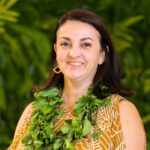 Mālia Sanders is NaHHA’s full-time Executive Director bringing over 25 years of hospitality leadership and event experience to the team. For the past 14 years, she has led NaHHA with a clear vision to integrate Native Hawaiian values and cultural integrity into the visitor industry. Mālia is a graduate of the University of Hawaiʻi and holds various professional certifications in topics such as Customer Service, Sustainability, Destination Management, Cultural Heritage Tourism, and Tourism for Native Nations & Communities from Cornell University, Arizona State University, George Washington University, and the University of Hawaiʻi. Mālia is a subject matter expert on Regenerative Tourism and has traveled the country speaking on topics relative to her expertise.
Mālia Sanders is NaHHA’s full-time Executive Director bringing over 25 years of hospitality leadership and event experience to the team. For the past 14 years, she has led NaHHA with a clear vision to integrate Native Hawaiian values and cultural integrity into the visitor industry. Mālia is a graduate of the University of Hawaiʻi and holds various professional certifications in topics such as Customer Service, Sustainability, Destination Management, Cultural Heritage Tourism, and Tourism for Native Nations & Communities from Cornell University, Arizona State University, George Washington University, and the University of Hawaiʻi. Mālia is a subject matter expert on Regenerative Tourism and has traveled the country speaking on topics relative to her expertise.
Session 5C: Building A Data Foundation To Supercharge Your Marketing Success
Jim Harenchar (Poarch Creek), CEO, Response Marketing Group
more info ...
Building A Data Foundation To Supercharge Your Marketing Success
Data is the currency of modern marketing, yet 76% of tourism marketers aren’t leveraging it for online marketing and targeting. Visitor data helps you target the right individuals, build customer profiles, serve personalized ads, and drive revenue and efficiency. Are you using your data to its full potential? With 95% of travelers conducting research online and 76% of travel market revenue predicted to come from online sales by 2028, digital marketing is crucial. Key insights include: 35% discover destinations on Instagram; 69.8% use search engines for planning; 36.5% turn to social media for inspiration; Referral marketing boasts a 9.5% conversion rate; 30% of marketers believe Facebook is the best platform for targeting new audiences, with 28% saying the same for Instagram. Data confirms that customer insight drives engagement. By using advanced personalization, travel brands can boost revenue per booking by 17%. With the booking window shrinking to 4-48 hours, reducing website form fields can increase conversions by 200%. Clean data is essential: eliminating unqualified leads can save 20% in operational costs, while prioritizing qualified group leads can boost conversions by 25%. Up to 40% of tourism data may be “dirty,” which affects targeting. In this session, we’ll walk through how to gather and use audience insights. Topics include: Identifying who is visiting your website and physical locations and understanding their behavior; How to collect and monetize audience data. What’s missing from your data, and how can you use what you already have to improve marketing and engagement? Measuring marketing across channels. Are you tracking and optimizing ads across Search (SEO/SEM), Display, Video/CTV/OOH, Mobile/SMS/Text, Email, and Social (Facebook, Instagram, TikTok)? We’ll explore why it’s essential to demand data-driven insights from agency partners and assess which ads and channels deliver the highest ROI. With the right foundation, you’ll learn to maximize your data to drive marketing success.
Speaker:
Jim Harenchar (Poarch Creek), CEO, Response Marketing Group
 James Harenchar is the CEO of RMG, bringing over 35 years of expertise in digital marketing, with a focus on data-driven strategies for the travel and tourism industry. Throughout his career, Jim has partnered with a diverse range of tourism brands to optimize their marketing efforts, leveraging actionable customer insights, personalized content, and multi-channel campaigns. Passionate about harnessing the power of data, he strives to simplify complex marketing concepts and make them actionable for all marketers. Founded in 1986, RMG’s approach is rooted in 38+ years of experience combining data insights with targeted messaging to drive real results. The company remains channel-agnostic, working closely with select clients to identify KPIs that drive increased visitor engagement, higher occupancy rates, improved return on ad spend, and stronger board advocacy. RMG is also behind several proprietary ad tech solutions that have delivered game-changing outcomes for Destination Marketing Organizations (DMOs) across the U.S. As the CEO, Jim also leads RMG’s Travel and Tourism Practice, serving clients such as Arkansas Tourism, Georgia Tourism, OWA/The Poarch Creek, Visit Savannah, Crested Butte, The Palm Beaches, The Ritz-Carlton, and The Resort Hotel Association. Known as a thought leader in the tourism sector, Jim is a frequent speaker at major industry
James Harenchar is the CEO of RMG, bringing over 35 years of expertise in digital marketing, with a focus on data-driven strategies for the travel and tourism industry. Throughout his career, Jim has partnered with a diverse range of tourism brands to optimize their marketing efforts, leveraging actionable customer insights, personalized content, and multi-channel campaigns. Passionate about harnessing the power of data, he strives to simplify complex marketing concepts and make them actionable for all marketers. Founded in 1986, RMG’s approach is rooted in 38+ years of experience combining data insights with targeted messaging to drive real results. The company remains channel-agnostic, working closely with select clients to identify KPIs that drive increased visitor engagement, higher occupancy rates, improved return on ad spend, and stronger board advocacy. RMG is also behind several proprietary ad tech solutions that have delivered game-changing outcomes for Destination Marketing Organizations (DMOs) across the U.S. As the CEO, Jim also leads RMG’s Travel and Tourism Practice, serving clients such as Arkansas Tourism, Georgia Tourism, OWA/The Poarch Creek, Visit Savannah, Crested Butte, The Palm Beaches, The Ritz-Carlton, and The Resort Hotel Association. Known as a thought leader in the tourism sector, Jim is a frequent speaker at major industry
Thursday, October 30, 2025
Breakout Sessions “6”
Session 6A: TBA
Session 6B: Positioning Indigenous Tourism for Global Growth: Strategic Alliances & Authentic Representation
Richard Peterson, President, U.S. Cultural & Heritage Marketing Council
more info ...
Positioning Indigenous Tourism for Global Growth: Strategic Alliances & Authentic Representation
Indigenous tourism experiences are increasingly sought after by global travelers looking for authenticity, storytelling, meaning, and connection. However, achieving equitable representation in global travel markets requires more than marketing—it requires strategy, partnerships, and visibility. This session, led by the US Cultural & Heritage Marketing Council (USCHMC), will explore how Native tourism businesses and enterprises can leverage cross-sector partnerships—regionally, nationally, and internationally—to elevate their collected communities, strengthen global representation, and build lasting trade relationships. Participants will learn how to work effectively with Destination Marketing Organizations (DMOs), cultural tourism councils, arts districts, global trade show platforms (like IPW, WTM, ARIVAL or ITB), and travel media & bloggers (national/international0 to ensure authentic inclusion. USCHMC will spotlight relevant case studies, including examples of how USCHMC has helped underrepresented communities co-create market-ready products and experiences, digital experiences, and collaborative itineraries that resonate with international tour operators and travel advisors. The session will conclude with practical steps for preparing & bolstering Indigenous tourism businesses for international market readiness—from content development and digital tools to packaging experiences for overseas distribution.
Speaker:
Richard Peterson, President, U.S. Cultural & Heritage Marketing Council
 Richard Peterson is a nationally respected leader in the fields of cultural tourism, destination marketing, and community engagement. As President & CEO of the U.S. Cultural & Heritage Marketing Council (USCHMC), he guides a national network of cultural, heritage, and tourism stakeholders to elevate authentic, place-based experiences that foster economic development, resident pride, and sustainable tourism growth. With over 25 years of experience spanning nonprofit leadership, global partnerships, and destination strategy, Richard has collaborated with DMOs, arts institutions, Indigenous related programs, and municipal leaders to develop award-winning programs that connect the diversity of cultural assets with visitation goals. He is frequently called upon for his ability to be a thought leader, engage strategic planning, design integrated marketing frameworks, and support emerging cultural districts and tourism corridors. Richard is known for his dynamic, solutions-driven discussions and presentations and has spoken across the country on topics ranging from creative economy activation to inclusive cultural storytelling. His engagements often include keynotes, advisory forums, and customized sessions that help state, regions and communities harness their unique heritage and arts ecosystems to drive meaningful impact. Whether leading town halls, leading a keynote program, moderating panels, or presenting at industry events, Richard brings energy, insight, and a collaborative approach to every opportunity.
Richard Peterson is a nationally respected leader in the fields of cultural tourism, destination marketing, and community engagement. As President & CEO of the U.S. Cultural & Heritage Marketing Council (USCHMC), he guides a national network of cultural, heritage, and tourism stakeholders to elevate authentic, place-based experiences that foster economic development, resident pride, and sustainable tourism growth. With over 25 years of experience spanning nonprofit leadership, global partnerships, and destination strategy, Richard has collaborated with DMOs, arts institutions, Indigenous related programs, and municipal leaders to develop award-winning programs that connect the diversity of cultural assets with visitation goals. He is frequently called upon for his ability to be a thought leader, engage strategic planning, design integrated marketing frameworks, and support emerging cultural districts and tourism corridors. Richard is known for his dynamic, solutions-driven discussions and presentations and has spoken across the country on topics ranging from creative economy activation to inclusive cultural storytelling. His engagements often include keynotes, advisory forums, and customized sessions that help state, regions and communities harness their unique heritage and arts ecosystems to drive meaningful impact. Whether leading town halls, leading a keynote program, moderating panels, or presenting at industry events, Richard brings energy, insight, and a collaborative approach to every opportunity.
Session 6C: TBA
Speaker: Kristy Durso, Founder, Accessible Travel Network
Speaker: Colleen Echohawk (Kithehaki Band of the Pawnee Nation; Upper Athabascan people of Mentasta Lake), President, Headwater People Consulting, LLC

